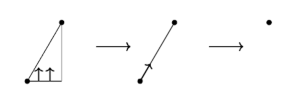Presented By: Combinatorics Seminar - Department of Mathematics
Discrete Morse Theory for Symmetric Delta-complexes
Claudia Yun, University of Michigan

In this talk, we generalize discrete Morse theory to the context of symmetric Delta-complexes. First introduced by Forman, discrete Morse theory is an adaptation of Morse theory for regular CW-complexes. It gives a schematic for collapsing cells in a CW-complex while maintaining the same homotopy type. On the other hand, symmetric Delta-complexes are a generalization of cell-complexes. They are topological spaces built from quotients of standard simplices, and they have played important roles in recent developments of tropical geometry. We generalize various concepts from discrete Morse theory, including discrete Morse functions and acyclic matchings on face posets, and prove parallel theorems for symmetric Delta-complexes. We also apply this new theory to the moduli space of tropical abelian varieties.